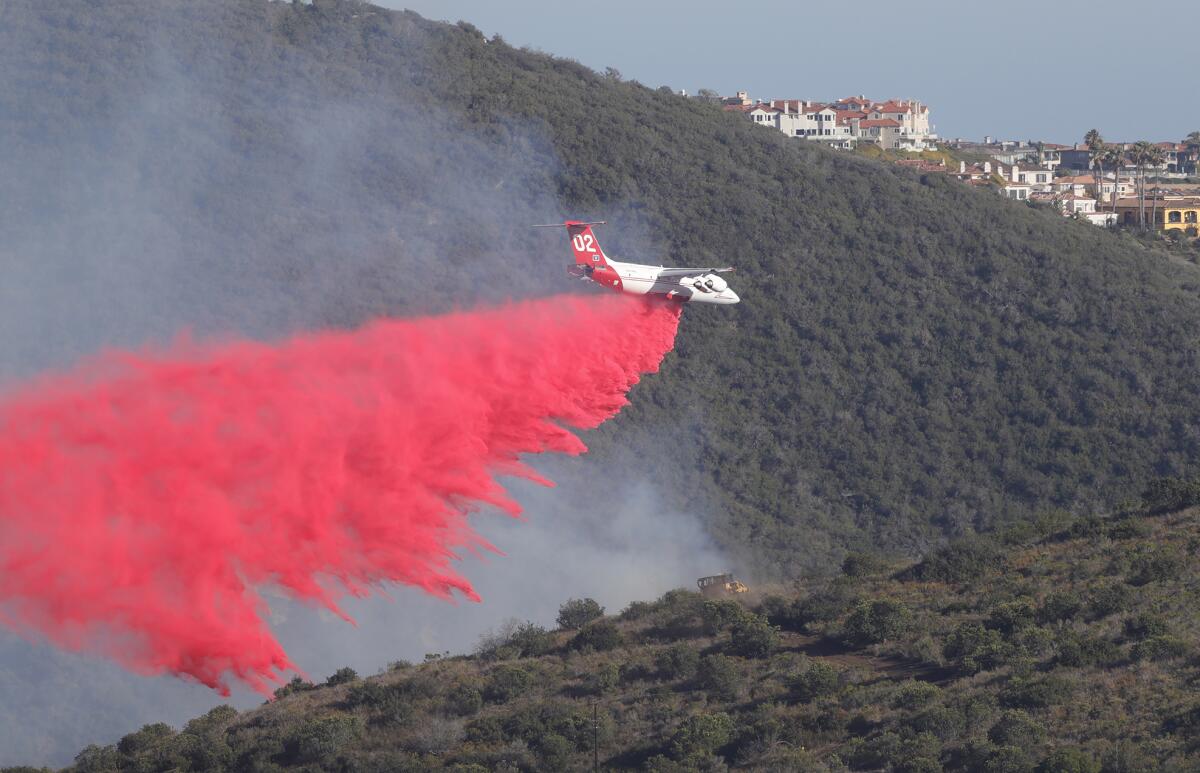Laguna Beach provides update on wildfire mitigation, fuel modification efforts

- Share via
Laguna Beach continues to make progress in preparing for and fighting wildfires, according to an update provided on those efforts to the City Council this week.
The council signed off on the wildfire mitigation and fire safety plan in 2019, a $23-million commitment that provided a list of 42 goals the city would like to accomplish to protect the community from fire events. The opportunities focus on infrastructure improvements, fuel modification, evacuation and notification.
Jeremy Frimond, an assistant to the city manager, said more than two-thirds of the 29 short-term items identified in the plan have been implemented.
In a report given before the panel on Tuesday, city officials shared that several cameras have been installed in Laguna Beach’s open space to assist with fire detection.
“The goal here was to install outdoor cameras, fire detection cameras that are essentially monitoring our open space to make sure we have constant contact, particularly during red-flag season,” Frimond said. “The goal here was to install two cameras, and the fire department has gotten six cameras in there this year.”
Mayor Sue Kempf inquired as to how often the open space cameras would be monitored.
“They’re not consistently monitored, but the use is if there’s a reported fire, we can put eyes on it immediately, and then we can determine the spread and direction of the fire,” Fire Chief Niko King said.
Frimond added that Ridge Reservoir and Signal Ridge both have two cameras, and the Moorehead and Jahrus reservoirs have one camera each.
Laguna Beach installed an emergency outdoor warning system, with 21 speaker sets put up around town. The city has plans to add four more locations to the notification system by early 2023. Bluebird Canyon has been identified as the site for two of those.
The city also received design approval for five utility undergrounding projects, as well as a road-widening project for Bluebird Canyon Road.
In November 2020, Laguna Beach debuted its helicopter refilling tank along the Arch Beach Heights fire road. City officials said they still hope to meet the target of a second helicopter refilling station to aid in fighting wildfires through the air by the end of this year, but the city is looking for a permanent structure, Frimond said.
A presentation was also given on the fuel modification program, which was started by the Laguna Beach Fire Department in 1991. There are 27 fuel modification zones, with 23 of those having been implemented with regular maintenance and vegetation management.
Some have been treated primarily by grazing goats brought in for that purpose. There are also zones subject to the Coastal Act, and in those zones, hand crews work around vegetation that is preserved as valued habitat.
“All of these projects really are just to give the responders some time,” King said. “If we have a fire that’s progressing up a hillside, once they get to these treated areas, it’s going to buy some time and slow the fire because it doesn’t have the contiguous fuel to continue to spread. The fuel modification zones, they don’t put fires out, they don’t prevent fires, but they assist … the first responders, so that we can get the equipment in place or use helicopters for the extinguishment of the fire.”
The city implemented three new zones (Park Avenue, South Laguna and Sunset) this year, Frimond said. They cover about 35 acres of wildland that will now receive the city’s ongoing maintenance. The city was on schedule to complete its annual maintenance of all implemented fuel modification zones by Friday.
All the latest on Orange County from Orange County.
Get our free TimesOC newsletter.
You may occasionally receive promotional content from the Daily Pilot.




